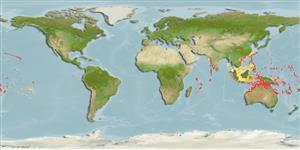Common names from other countries
Issue
The species Acanthurus nigros Günther 1861 is considered valid in Eschmeyer (CofF ver. Sep. 2011: Ref. 88002) following Randall & Parenti (2011). But could be an unjustified ementation of nigroris. More studies are needed.
Environment: milieu / climate zone / depth range / distribution range
Écologie
marin récifal; profondeur 1 - 90 m (Ref. 1602). Tropical; 30°N - 26°S, 52°E - 137°W
Indo-Pacific: Aldabra and Seychelles to the Hawaiian, Marquesas and Tuamoto Islands; throughout Micronesia.
Taille / Poids / Âge
Maturity: Lm ? range ? - ? cm
Max length : 25.0 cm TL mâle / non sexé; (Ref. 2334)
Épines dorsales (Total): 9; Rayons mous dorsaux (Total): 24-27; Épines anales 3; Rayons mous anaux: 23 - 25. Color drab dark brown; spots on body located at the rear base of dorsal and anal fins. Black spot at rear base of dorsal fin not large, its greatest width more than 2 times in eye diameter. White posterior margin of caudal fin very narrow, its width less than 4 times in pupil diameter. No definite black margin around groove of peduncular spine. Body depth 1.8 to 2 times in SL. Maximum standard length about 20 cm (Ref 9808).
Inhabits clear lagoon and seaward reefs; often in areas with mixed coral, pavement, rubble and sand substrates (Ref. 1602). Benthopelagic (Ref. 58302). Occurs singly or in small groups (Ref. 9710). Feeds on filamentous algae, diatoms and fine algal film of compacted sand (Ref. 1602). Relatively uncommon throughout Micronesia; rare on Great Barrier Reef.
Life cycle and mating behavior
Maturité | Reproduction | Frai | Œufs | Fécondité | Larves
Randall, J.E., 1956. A revision of the surgeonfish genus Acanthurus. Pac. Sci. 10(2):159-235. (Ref. 1920)
Statut dans la liste rouge de l'IUCN (Ref. 130435)
CITES (Ref. 128078)
Not Evaluated
Menace pour l'homme
Harmless
Utilisations par l'homme
Aquarium: Commercial
Plus d'informations
RéférencesAquacultureProfil d'aquacultureSouchesGénétiqueElectrophoresesHéritabilitéPathologiesTraitementMass conversion
Outils
Articles particuliers
Télécharger en XML
Sources Internet
Estimates based on models
Preferred temperature (Ref.
115969): 24.8 - 28.8, mean 27.4 (based on 286 cells).
Phylogenetic diversity index (Ref.
82804): PD
50 = 0.5000 [Uniqueness, from 0.5 = low to 2.0 = high].
Bayesian length-weight: a=0.02344 (0.01103 - 0.04981), b=2.96 (2.79 - 3.13), in cm Total Length, based on LWR estimates for this Genus-body shape (Ref.
93245).
Niveau trophique (Ref.
69278): 2.0 ±0.00 se; based on food items.
Résilience (Ref.
120179): Haut, temps minimum de doublement de population inférieur à 15 mois (Preliminary K or Fecundity.).
Fishing Vulnerability (Ref.
59153): Low vulnerability (15 of 100).
